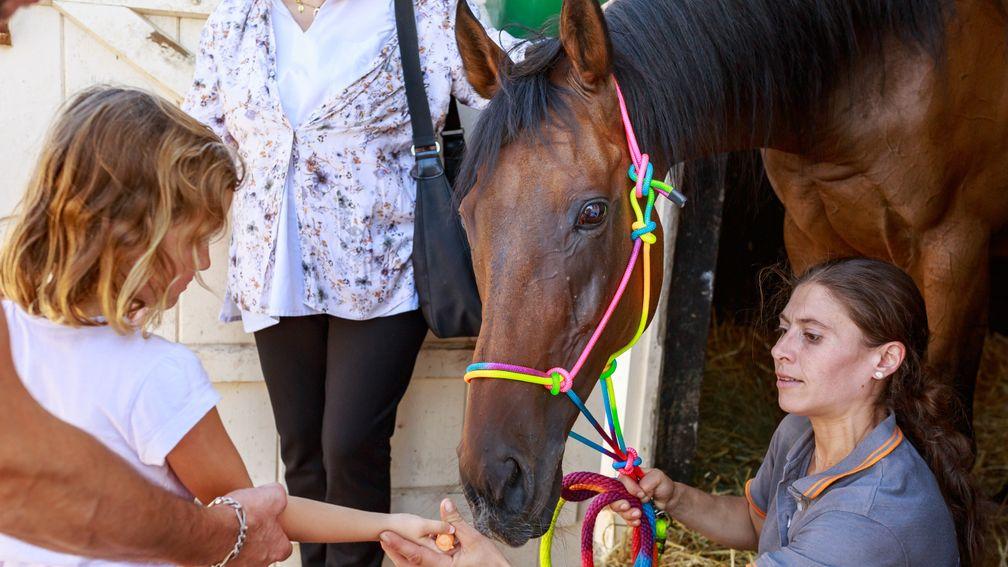'Nobody seeing the Cirrus Des Aigles videos would have a doubt about welfare'
Solene Hudbert on dangers to our sport posed by activists and how we can respond

Our Godolphin Flying Start blogs continue with Solene Hudbert, 24, from Chantilly. She graduated in 2018 with a Masters Degree in International Business and Project Management from the ESSCA Management School. During her studies, she spent time at Kildaragh Stud, Ireland and as pupil assistant with Nicolas Clement. Prior to the Godolphin Flying Start, she worked for Cambridge Stud and Te Akau racing in New Zealand, and was also assistant to jumps trainer Mickaël Seror. She is currently at Kildangan Stud
The racing industry will face many challenges during the coming decades. The most pressing will certainly be the threat of animal rights activists.
We have experienced it slightly in Europe, but numerous animal rights groups have already been quite aggressive overseas, notably in Australia, with the 'Nup to the cup' movement last year, resulting in Taylor Swift cancelling her Melbourne Cup concert.
More recently in the USA, Peta stated that it had become shareholders of four companies managing American racecourses, intending to gain seats on the boards of directors and pass measures such as banning the whip, barring medication being given within 15 days of a race, and the elimination of breezes during two-year-old sales.
Their claims are all not necessarily absurd, but that is a subject for another day.
So how will we face this rising challenge, which seems to be gathering more and more momentum each year?
I am a strong supporter of the animal cause, and animal welfare is a fight I believe in. So why, you may ask, would I decide to dedicate my life to racehorses?
I have been lucky enough to grow up in the industry, and I know the passion and love we have for the animal; I know that in some places racehorses have a better standard of living than humans. I am convinced education of, and communication with, the general public can help protect our sport.

Of course, we will not change the mind of the more extremist animal rights supporters, and it would be, in my opinion, a waste of time and energy to engage in a never-ending fight with them.
However, we can get inspired by their strategy to rally support: Peta, and other associations, are experts in communication, and their favourite playground is social media.
Last year, the French association ‘L214’ collaborated with a social media-based online news platform. They published a documentary showing how racehorses were going to the factory once their racing career was over - in France, it is unfortunately still legal to eat horse meat.
To demonstrate their statement, you can see videos of horses waiting to be put down and numbers coming from questionable sources: they alleged that 70 per cent of the racehorses would apparently end their life at the slaughterhouse.
It is in this way that myths will get into and live in people’s heads, especially if they don’t know anything about the industry and don’t get the chance to see it from another perspective.
In this way over recent years, we have noticed disapproval spreading in the comments of racing-related posts on social media. Most of those people are surely animal lovers, not necessarily extremists, but are ignorant in believing what they have read.
Our role should be to show them we are animal lovers too, and that is why we decided to dedicate our lives to horses.
Recently, 7HorseRacing – an Australian racing channel - released a video with different racing scenes showing its main actor: the horse. This was accompanied by a powerful voiceover, saying: “How lucky we’ve been to fall in love with these horses...they’ve made us feel better inside.”
It is this kind of communication I believe our sport needs to promote, rather than marketing based on the money and betting sides of racing.
Another example is Corine Barande-Barbe being active on social media about the brilliant Cirrus Des Aigles, updating her followers even since he retired. None of the people seeing the various videos and photos of him would ever have a single doubt about this horse’s welfare.
I should also mention the alliance 'Together for Racing International' that just launched its website last month, getting the biggest racing nations involved in the education and community engagement that connects people with the thoroughbred industry.
'Love the animal before the sport' should be the banner carried by the racing industry and showed to the world. It is our common duty to let outside people see the inside of our world - maybe their interest in it would grow.
As racing fans, it is our role to prove our love for horses and to spread that message. If animal rights activists can get people to join their cause, surely we can too.
Read Caitlin Smith's Flying Start blog
Published on 25 November 2020inFeatures
Last updated 13:09, 6 January 2021
- Oh, Gino took the stage all right but Walk In The Park and Authorized stole their share of Aintree limelight
- 'You sometimes forget they're stallions' - meet up-and-coming eventing stars Galileo Dance and Galileo's Secret
- 'Two decades in the bloodstock business has taught me more about people than horses' - meet Tattersalls rep Gaurav Rampal
- How pouncing on a 3,000gns broodmare helped Chris Liesack breed exciting Cuban Tiger
- Captain Cody keeping the spark alive for Waterford breeder Richard Morrissey
- Oh, Gino took the stage all right but Walk In The Park and Authorized stole their share of Aintree limelight
- 'You sometimes forget they're stallions' - meet up-and-coming eventing stars Galileo Dance and Galileo's Secret
- 'Two decades in the bloodstock business has taught me more about people than horses' - meet Tattersalls rep Gaurav Rampal
- How pouncing on a 3,000gns broodmare helped Chris Liesack breed exciting Cuban Tiger
- Captain Cody keeping the spark alive for Waterford breeder Richard Morrissey